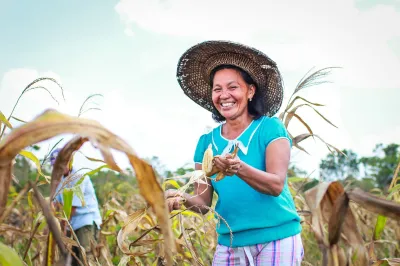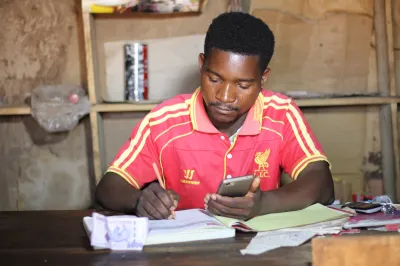How Fostering Competition in LAC Can Revolutionize Financial Inclusion
In recent years, the Latin America and Caribbean (LAC) region has witnessed remarkable progress in advancing financial inclusion. According to Findex 2021, account ownership in LAC saw the largest increase (18 percentage points) of any developing world region since 2017, resulting in 73% of adults with an account in 2021. The Global Microscope 2020 report emphasized that financial inclusion was key to LAC's economic response to the COVID-19 crisis, which induced a recession that ranks among the most severe in a century.
At the same time, the crisis stimulated rapid digitization, which has ushered in a new era of financial solutions globally that have the potential to bring many poor people into the formal financial sector and contribute to sustainable development. Evidence shows that inclusive digital financial services enable 13 of the Sustainable Development Goals (SDGs) and could help the world get back on track to achieve the SDGs by 2030.
Governments in LAC recognize not only the importance of advancing digital financial inclusion, but also that fostering competition among financial service providers leads to improved choices, lower costs, and high-quality services for all consumers—including those living in poverty. Instead of incumbent banks fighting for a bigger piece of the pie, the size of the entire pie gets bigger as many financially excluded and underserved low-income consumers become viable business targets.
Financial reforms over the years
Over the years, governments in LAC have undertaken numerous initiatives to forge greater financial inclusion. Postal reforms in Brazil and reforms aimed at increasing the role of non-bank financial institutions in Mexico are but a few examples. And, while these reforms have had some positive impact on financial inclusion where they were implemented, they have fallen short of fully unlocking competition among financial service providers. As a result of this, financial sectors in LAC have remained concentrated and shallow.
Many countries still grappled with large bank oligopolies that lack incentives to serve low-income clients. In fact, the financial sector across countries in LAC averaged around 30% of GDP in 2021, according to the 2021 IMF Financial Development Index, compared to around 32% across countries in Asia and the Pacific, 46% in Europe, and 66% across advanced economies.
By 2021, 60% of the unbanked in LAC said financial services were too expensive and financial institutions were too far away. So, while the breadth of financial inclusion (i.e., access to financial services) has increased, the depth (i.e., usage of financial services) hasn’t. This means financial inclusion remains shallow.
To more purposefully promote competition while addressing the challenges inherent within a region that has a large informal economy, a large rural sector, and populations dispersed over vast remote areas, governments in LAC are now pursuing a more promising strategy. They are leveraging interoperable payment systems and open finance to promote a more inclusive and competitive business environment. This approach, which increases the size of the market pie, not only holds promise for increasing the breadth and depth of financial inclusion but also its utility — i.e., enhancing the practical benefits and positive outcomes for consumers.
Two key initiatives promoting competition today
Several countries in the region have implemented instant interoperable payment reforms, which facilitate payments between providers (including new players such as fintechs and digital banks) within seconds at any time of the day or night. Early evidence suggests that this interoperability has increased the usage of low-value accounts. Brazil’s instant payment platform, PIX, has been used by more than 140 million individuals (about 80% of the adult population) in two and a half years, according to BCB statistics as of May 2023. There are now more than 3 billion transactions taking place each month.
Following the launch of PIX, the number of total bank clients grew by over 40 million in two years, according to BIS, and an estimated 50 million Brazilians made their first digital payment ever. Greater use of digital payments can provide a pathway into the digital economy, which in turn can open up additional economic opportunities and help households and small businesses manage weather shocks and invest in a green future. This is of particular importance in a region marked by income inequality and climate shocks that are becoming more acute.
While a robust payment system that is digital, interoperable, offers instant settlement, and is open to third-party payment initiation allows for greater competition among banks and non-banks, it cannot alone improve the depth of financial inclusion. Initiatives like the new pro-competition open finance framework championed by Brazil hold great promise in leveraging data to advance the reach and benefits of financial services.
By breaking down information asymmetry between customers and the longstanding over-concentration within the banking sector—which in many markets has traditionally led to higher margins and lower incentives for new market entrants— it addresses some of the most fundamental obstacles that inhibit the access and use of data in financial services.
Meanwhile, open finance gives innovators incentives to enter the market and the flexibility to adopt technologies that leverage non-traditional digital data trails to help promote financial empowerment —particularly among traditionally underserved segments, such as people living in poverty, women, and small businesses. A responsible and inclusive data ecosystem is key to allowing low-income people to benefit from their data.
Of course, in addition to interoperable payment systems, for open finance to flourish responsibly, several enabling policies need to be in place, including national IDs, tiered know-your-customer (KYC) data protection, and other consumer protection frameworks, among others.
Overall, well-designed initiatives that increase competition among financial service providers within a market and promote innovation hold great promise for increasing the depth, breadth, and utility of financial inclusion in a responsible manner. To maximize their potential, policymakers will have to balance various policy objectives, including promoting competition and innovation on the one hand and ensuring protection and stability on the other. Pro-competition initiatives in the LAC region, with Brazil at the helm, are great examples to watch.
Editor's note 02/05/24: A previous version of this blog stated an 18% increase in account ownership in LAC since 2017 - this has been corrected to indicate an 18 percentage point increase instead.




Add new comment